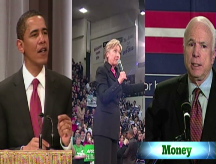Political donations: 3 things to know
Giving to Clinton, McCain or Obama? Here's how to get the most out of supporting your favorite candidate.
(Money Magazine) -- As November draws nearer, expect a barrage of pre-recorded phone calls and other pleas from presidential hopefuls who want your vote - and your financial support.
Already the candidates have raised nearly as much as their counterparts did in the entire 2004 race, with several months still to go. Before you lend a hand to a pol, keep these facts in mind.
For 2008 you can donate $2,300 to a candidate per primary and $2,300 per general election; $28,500 to a national party; $10,000 per state or local party; and $5,000 per political action committee (PAC). (The limits are adjusted every two years for inflation.)
You can give limit-free to a 527, a thinly veiled candidate lobby group lightly regulated by the Federal Election Commission (FEC). Example: the anti- Kerry Swift Boat Veterans for Truth from '04.
As a result of post-Watergate reforms, whenever you make a campaign contribution, you have to provide your name, job, employer and address.
Once your 2007-08 contribution to a candidate, party or PAC exceeds $200, that campaign must pass your info to the FEC, which posts it on FEC .gov. Sites like OpenSecrets .org and FundRace.org then display it in searchable databases.
If you give $200 or less, the campaign doesn't have to report it to the FEC.
No matter whether the donation is to a candidate, a PAC, a party or a 527, you can't take a federal tax deduction for it. If you want a write-off, give instead to a charity your candidate supports.
If you like the Democrats' plans for universal health care, you might give to Physicians for a National Health Program. Or, if you oppose tighter gun control, you could contribute to the National Rifle Association Foundation.
Send feedback to Money Magazine ![]()
Fuzzy math on the campaign trail
Health care: Solving a $2 trillion puzzle
Election '08: Wall Street's big donors



